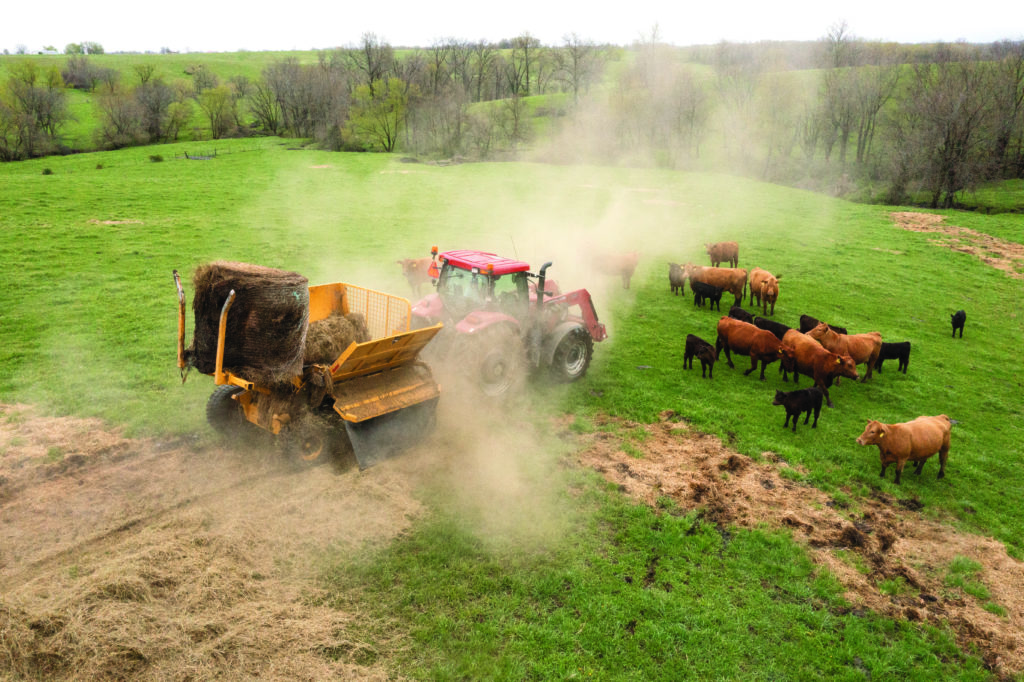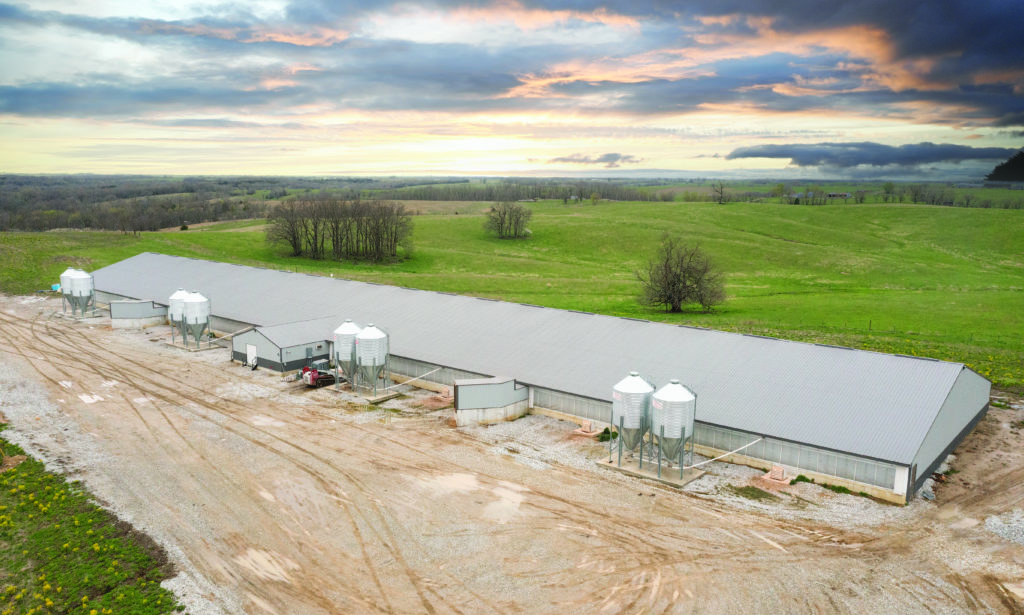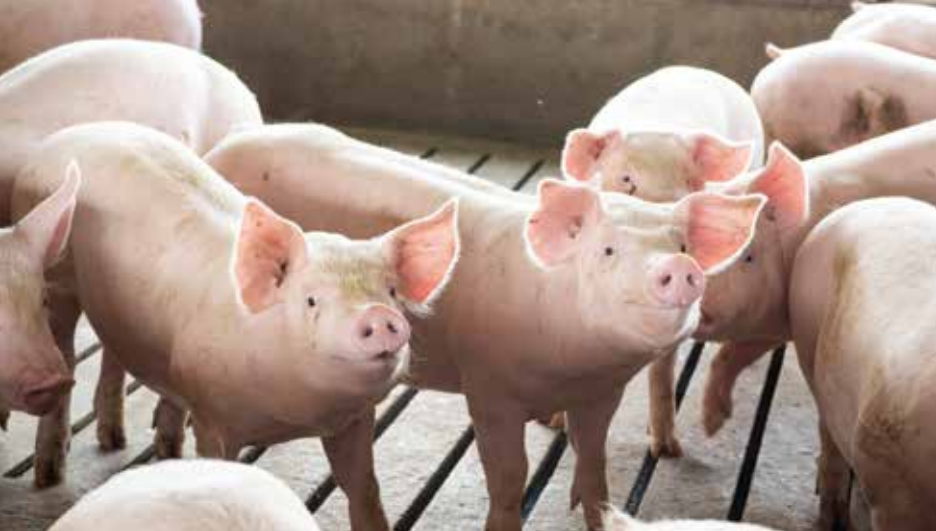
Livestock Legacy
June 17, 2022
Written By Jason Jenkins
Overcoming tragedy, fourth-generation Sullivan County farmer forges ahead to grow the family business in animal agriculture
Growing up in north Missouri’s Sullivan County, just a few miles from Green City, Trevor Shafer always felt his place was on the family farm. After all, the Shafers’ roots run deep in this ground. Trevor’s great-grandfather, Charlie, started the operation in 1935. His grandfather, Leon, and his father, Roger, both followed in those footsteps. Young Trevor planned to do the same.
By the time Trevor was 12 years old, the Shafers’ farming endeavors included row crop operations, a spring-calving beef cattle herd and several finishing barns where they raised market hogs on contract. After graduating high school, Trevor enrolled at nearby North Central Missouri College in Trenton. Though he wasn’t particularly excited about higher education, he considered it as a brief detour on his way to a career in agriculture.
Tragedy, however, would hasten Trevor’s full-time return to the family homestead. In June 2009, Roger Shafer lost his life due to injuries sustained in a pickup accident. He was only 49 years old.
“It was tough when my dad died,” said Trevor, who was only 19 at the time. “I had to start learning a lot quickly, and most of it I learned the hard way. I had to grow up fast.”
Life Lessons by Trial and Error
In the wake of their father’s death, all three Shafer siblings—Trevor, along with older brother, Logan, and older sister, Gentrie—helped their mother, Tammy, maintain the family farm. Trevor didn’t return to college in the fall. Logan suspended his own construction business, while Gentrie put college on hold for the remainder of the year.
Initially, the brothers worked together on all aspects of the family farm. However, Trevor said that from the outset, he knew his agricultural interests leaned toward the livestock side of the operation and not the row crops.
“There’s just too much uncertainty for me in corn and beans,” he said. “Folks will say that when you row crop, you just work a couple months in the spring and a couple in the fall. But to me, it just seemed like it never quit.”
Trevor eventually divested himself of row crop responsibilities. While he operated a custom application business for a few years, his focus was managing his mother’s cattle herd and hog finishing barns. Though he’d occasionally raise some feeder cattle for market, the cow/calf operation was and continues to be the primary focus.
“After a few years of just taking care of my mom’s spring-calving cows, my brother and I went in on buying some fall-calving cows,” Trevor explained. “Then I added some more spring calvers of my own and just kept growing from there.”
Today, the Shafers manage more than 1,500 acres of pasture and hay ground to support their beef operation. Trevor prefers to crossbreed his Angus cows to Hereford bulls, producing “black baldies.”
“Red or black, it doesn’t really matter to me,” he added. “I’ll run some red Angus and Simmental, too, just a little bit of everything. You’re not going to see picture-perfect cows out in our pastures, but we keep the mommas who are good milkers and who take good care of their calves.”
The young livestock producer also continued overseeing the hog operation for his mother. In 2020, he invested in his own nursery barn. The 80-by-400-foot facility provides enough room to house around 9,000 weaned piglets.
“In Mom’s barns, we raise fat hogs to go to market, but in mine, we’re taking those little pigs and raising them up to 50-60 pounds,” said Trevor, who serves as a delegate for MFA Oil. “We’ll turn out a group about every seven weeks. Then, we’ll wash everything down, sanitize the barn and bring in the next group.”
While he acknowledged that his love of animal husbandry probably stems from the fact that it’s the only vocation he’s ever known, Trevor added that caring for livestock provides a very specific sense of purpose.
“With the pigs, you get them in as little ones, and how well you take care of them determines their success and yours,” he said. “When you provide them with the best feed and living conditions, you’ll produce healthy, productive pigs.
“With the cattle, you’re making sure those mommas have everything they need to grow healthy calves,” Trevor continued. “When it’s time to calve, you’re checking on them, making sure that everything goes how it’s supposed to and helping if there’s trouble. When you get those calves worked and kicked out on good grass, that’s when it’s really fun.”
Fifth-Generation Farmer on the Way
The construction of the nursery barn wasn’t the only big event for Trevor recently. In October, he married Jalynn Gilworth. The couple also has another nursery project in the works as they are expecting their first child in mid-August.
“The farm that joins up to the family place came up for sale recently, so we bought it and now we’re remodeling the house,” Trevor said. “We’re really hoping the contractors finish up before the baby arrives.”
The additional acreage that came with the new farm has the 32-year-old considering an expansion of his cow/calf operation as well as the potential addition of a flock of sheep or a goat herd. “We have a bunch of little lots with electric fence already ran, so we’re thinking about trying it,” he said. “Nothing crazy at first. Just a few to see how they work in with the cattle and hogs.”
Though it’s been 13 years since Roger Shafer passed away, Trevor continues to honor his father’s memory and his family’s farming legacy, following the lessons he learned as a young boy.
“Every day, we work hard to make the farm better—not just for our animals or for ourselves, but for the future and for future generations,” said the expectant father. “There’s a lot of pride that comes with knowing that you’re building something that will last beyond yourself.”





